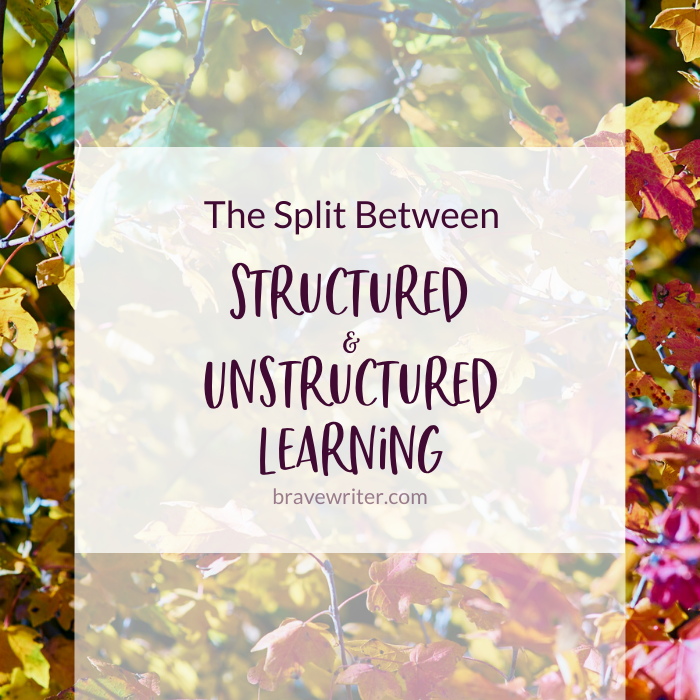Brave Writer Podcast: The Split Between Structured & Unstructured Learning

Today’s podcast focuses on how to be a partner to your child in writing and learning. Partnership is the key feature of a successful homeschool. Do we get there through structure or is it better to leave your child to discover his or her own love of learning? We’ll explore these ideas today.
Whether you’re drawn to aspects of Charlotte Mason, a boxed curriculum, Unschooling, Classical Education, or even public school, ask yourself: Does this philosophy of education facilitate a deeper connection to your children while they learn?
While writing programs and teaching methodologies tell you what to do, they often stop short of showing you how. My hope is to help you foster trust and vision for the future to establish a good relationship between parent and child.
How can we help our children embrace and love writing?
The problem isn’t that we don’t have good information; you can Google ‘expository essay’ and find everything you need to know about it.
But how can you get a 16-year-old boy to sit down and write that essay? How can you help him generate insight? How can you help him care?
We believe that, at the end of the day, your relationship with your child is what matters. You can teach everything that you want your kids to learn if you are actually connected to each other.
Exploring Structured & Unstructured Learning
You’re welcome to explore any philosophy, and we believe you should – variety is the spice of life, and there are distinct benefits to both structured and unstructured learning!
But if we accept this assumption – that what matters most in a homeschooling environment is your relationship with your children – then we need to honor it when we explore and borrow from different learning methodologies.
Of course, this isn’t always simple.
- What if you love one methodology, but your child loves another? Remember, you already have an education, so you have to move towards what helps your child – you have to. You can’t try to create the education that you wish you had.
- You may try to apply a strategy that you love only to find that it feels wooden or false in your family. But if you still like the idea, dig deeper: what is the aim of that particular strategy, and what actually catalyzes that ownership of the material? With some creativity, you can find a way to achieve the same learning outcomes while simultaneously facilitating a deeper connection with you children.
- What if you lack imagination or passion for a specific subject area, and you want to be hands off, but you still want your children to be able to explore their curiousity for that subject? The hardest thing in homeschooling is feeling bound, whether you feel bound by structure or the need not to interfere, but what we’re really looking for is attentiveness, flexibility, and a willingness to be open to all potential solutions.
You don’t need to choose one model and stick to it rigorously, and you don’t need to sample every single thing available. But the 21st century model for education is a multiplicity of design, and all of these various design methods and models will help your children prepare, in different ways, for all of the opportunities that they will have in the 21st century.
A Home Educator’s Most Generous Gift
One of the most generous acts you can offer, as a home educator, is a well-thought-out course of study in at least one subject area, each quarter, for the coming school year.
It may be difficult to give that level of development to every subject for all ages, but you can select literature or a historical time period that will affect most of your children; you can coordinate various activities, readings, outings, and related experiences that will illuminate some aspect of the subject area that you intend to explore.
There is no right way to do this homeschooling thing – but there is your child, and we’re on their team.
Would you please post a review on Apple Podcasts for us?
Help a homeschooler like you find more joy in the journey. Thanks!

















